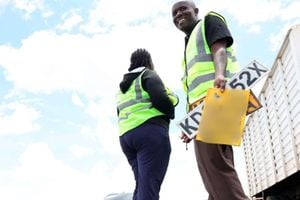How rapper became a lover of spoken word

Before we begin the interview, Mark Joshua Ouma, better known as Teardrops, asks if he can recite a few lines from a poem that has just struck his mind. PHOTO| COURTESY
What you need to know:
IN-- 2013, I attended the event held at Dass Ethiopian Restaurant. I came third position, but I didn’t lose hope. After participating eight times without success, I took a month of to relax and re-strategize.
When I returned, I won. My poems were recorded and I feature in subsequent poetry events, including at a Kwani? session.
Before we begin the interview, Mark Joshua Ouma, better known as Teardrops, asks if he can recite a few lines from a poem that has just struck his mind.
“Me huspeak da truth/ uliza talib kweli/ I am destiny’s child/ even Beyoncé Knowles.”
Then he continues
“I was born in Makongeni in Nairobi, but grew up in a hood called Kisulisuli in Nakuru, he begins
I started off as a rapper, with four other friends in 2000, rapping in clubs. to rap. At some point I wanted to be the youngest rapper but I got old too fast. I discovered that whenever I performed with music in the background, it distracted me. Sometimes the beats obscured my words so I decided not to perform without music for a while.
After my mum passed on, I went back f my rural home in Oyugis and lived in an informal settlement called A Thousand Streets. There wasn’t much for me to do in Oyugis because in terms of art or music, so I joined Oyugis Craft School to study electrical engineering andgraduated with a certificate in 2010. Thereafter, my sister invited me to live with her in Nairobi.
Worked as a mason for a while, earning Sh300 per day before I I decided to try my hands at something else. I made greeting cards, light bulb stands, and Ankara handbags, among other things.
In July 2012, I attended the Nokia Don’t Break the Beat auditions in Mombasa in July 2012 using money borrowed friends. Despite not winning, I remained hopeful and attended the auditions in Kisumu the following year. This time I was lucky to be selected, but as an extra, since they needed only 16 contestants. The final event was held in Nairobi and but unfortunately, I didn’t make it.
I’d never heard of the spoken word, until a friend took me to a Kwani? Open Mic session in late 2012 and I was smitten. The presenters were very passionate; I had never seen anything like that and instantly knew that I wanted to pursue that art form as a career. Better still, a friend of mine told me that I could win a recording deal, among other goodies, if I entered one of the poetry competitions, the Slam Africa Poetry.
IN-- 2013, I attended the event held at Dass Ethiopian Restaurant. I came third position, but I didn’t lose hope. After participating eight times without success, I took a month of to relax and re-strategize.
When I returned, I won. My poems were recorded and I feature in subsequent poetry events, including at a Kwani? session.
Currently I manage and Slam Africa, now known as Kenya Poetry Slam. I was picked for the job because I was considered capable of mentoring upcoming artistes. Today, Kenya Poetry Slam has an office and mentors artistes at Pawa254.
Everything inspires me. I know that sounds simplistic, but that’s the only way I can describe it. Everything I read, see, listen to, every person I love or hate, every time I feel anything – it all ends up coming out in my creative work. The poems or pieces that Iwrite are almost always personal and centre on the themes of love, faith, redemption and the struggle to be understood by those closest to us.
I rehearse my poems at my humble home. I make my room tranquil by drawing the curtains, closing the door and have sound proofing. Then I bring out the mirror and start rehearsing.
My sister tried to link me up with a few people in the industry but not everyone was willing to help. Not everyone appreciated my art back then. My sister introduced me to a friend who gave me books on revolution and pan-Africanism. At first I was hesitant because I wanted someone who was well versed in the arts.
Then, while visiting a libray in Korogocho library, I met Wawesh Mjanja and he listened to me recite my poems. He encouraged me very much and even agreed to record my poems. We soon became friends and he has helped me on my journey ever since.
I also got acquainted with Ian Jamal, who became instrumental in spoken word journey and published my debut album titled Shengspear. The album sold out when it was launched last year at the Alliance Française.
The 25-year-old, ends our interview with a brief recitation: “Hiyo time-less tumespend ni timeless/nimejua life ni drama/Kiswahili na English ni grammar/ but sheng ndio lugha ya mama.
Ukidhani mi ni wazimu/ like father like son/then God must be crazy.




